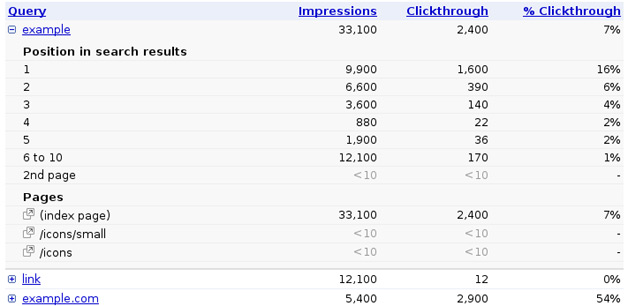Google has just started sharing more detailed data for each individual search query in the Top search queries feature in Webmaster Tools. Google used to just report the average position at which your site’s pages appeared in the search results for a particular query. Now users can click on a given search query to see a breakdown of the number of impressions (number of times your site’s pages appeared in the results for the query), as well as the amount of clickthrough (number of times searchers clicked on that query’s search results to visit a page from your site) for each position your site’s pages appeared at in the results associated with that query. Google also shows a list of your site’s pages that were linked to from the search results for that search query.
Is the new data being provided by Google of use to you? Tell us what you think.
How This New Data Can Help Site Owners
WebProNews spoke with industry veteran Jill Whalen of HighRankings about how this new data can help site owners. "In the past, I haven’t found the data in Webmaster Tools all that helpful other than the occasional finding of a crawl error," she says. "Some of the information they provide isn’t quite accurate, such as when they say that certain Meta descriptions are duplicates when they actually aren’t. These inaccuracies cause people to wonder what they’re doing wrong and in some cases they even panic or waste time ‘fixing’ things that were not broken in the first place, just because they believe everything that comes out of Google."
"This new data–assuming it’s accurate–provides a new layer of information beyond that which we can typically get elsewhere," Whalen continues. "As far as I know, there’s no other way to know the actual number of times an organic listing in Google is shown to people for a given keyword phrase. That’s pretty interesting and important information!"

"Where I see some real value, however, would be in conversion optimization–trying to increase the clickthroughs for your existing organic listings. Just knowing what your clickthrough conversion rate actually is, is a whole new set of data that we never had before."
Another industry veteran, Aaron Wall of SEOBook, tells me, "For years Google has provided some mystery meat data of marginal value and so I typically have not recommended registering with their webmaster tools. But this is the first tool they have offered which flips that recommendation on its head, as these stats give you new insights into how you are doing in search – data that is not easy to get anywhere else." He’s got an interesting post up about it himself.
How Accurate is the Data?
Google’s addition of the new data has been met with a great deal of enthusiasm. Comments on Google’s announcement are overwhelmingly positive. That’s not to say, however, that there isn’t some amount of skepticism.
"As I said, this data will be very useful if it is indeed accurate. There’s been some Twitter buzz from other SEOs whose data doesn’t match up with their Google Analytics," says Whalen. "For our High Rankings website, the clickthroughs for any given keyword phrase didn’t exactly match what my Google Analytics showed for the same keyword phrases, but it was fairly close. For instance, my top two Google organic keyword phrases showed 3,020 and 1,193 visits when using Google Analytics. Via Webmaster Tools, the same keyword phrases show 2900 and 1300, respectively. That’s pretty close. Perhaps they’re sort of just rounding off (in a strange kind of way!). Other phrases had similar differences in the numbers."
Regardless of how precise the information is, webmasters have some new numbers to sink their teeth into, and assuming that many more share similar views to Whalen’s this might make Webmaster Tools a great deal more useful to a lot of site owners. In fact, a lot more site owners may soon be using Webmaster Tools for the first time. Google also just announced a new deal that will insert Google Services for Websites into the latest version of the Plesk Panel, which is said to be used by millions of site owners. Webmaster Tools is part of that Services for Websites package.
Will you find this new data from Google useful? Let us know.







 WebProNews is an iEntry Publication
WebProNews is an iEntry Publication